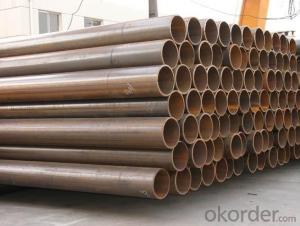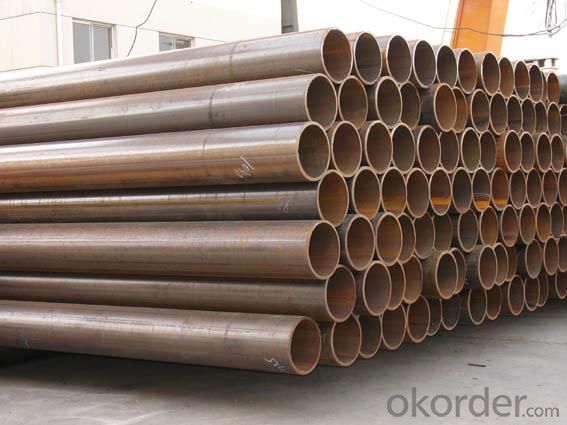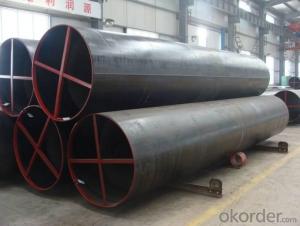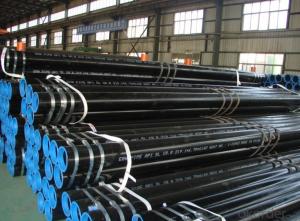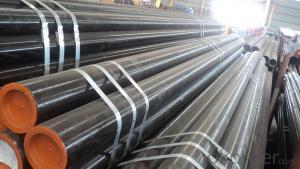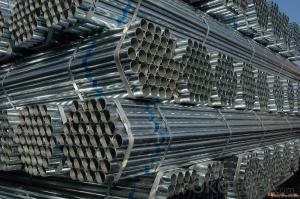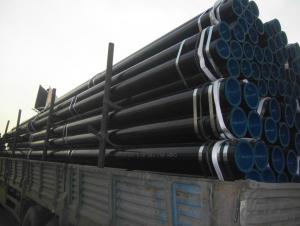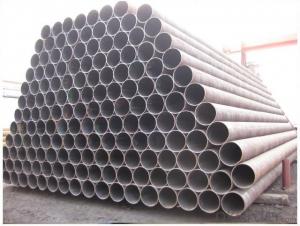Steel Pipe -- Welding Steel Tube ERW Factory
- Loading Port:
- Tianjin
- Payment Terms:
- TT OR LC
- Min Order Qty:
- 30 m.t.
- Supply Capability:
- 8000 m.t./month
OKorder Service Pledge
OKorder Financial Service
You Might Also Like
1、Structure of Steel Pipe -- Welding Steel Tube ERW Factory
Welded Steel Pipe is to be used for conveying gas, water, and petroleum foroil and natural gas industries. And used for structural steel pies purpose. As the manufacturing process does not include any welding, seamless pipes are perceived to be stronger and more reliable. Historically seamless pipe was regarded as withstanding pressure better than other types, and was often more easily available than welded pipe.
2、Main Features of Steel Pipe -- Welding Steel Tube ERW Factory
• High manufacturing accuracy
• High strength
• Small inertia resistance
• Strong heat dissipation ability
• Good visual effect
• Reasonable price
3、Steel Pipe -- Welding Steel Tube ERW Factory: Specification:
Standard | GB, DIN, ASTM ASTM A106-2006, ASTM A53-2007 |
Grade | 10#-45#, 16Mn 10#, 20#, 45#, 16Mn |
Thickness | 8 - 33 mm |
Section Shape | Round |
Outer Diameter | 133 - 219 mm |
Place of Origin | Shandong, China (Mainland) |
Secondary Or Not | Non-secondary |
Application | Hydraulic Pipe |
Technique | Cold Drawn |
Certification | API |
Surface Treatment | factory state or painted black |
Special Pipe | API Pipe |
Alloy Or Not | Non-alloy |
Length | 5-12M |
Outer Diameter | 21.3-610mm |
Grade | 20#, 45#, Q345, API J55, API K55, API L80, API N80, API P110, A53B |
Standard | ASME, ASTM |
1) Material:20#(ASTM A 106/A53 GRB.API5LGRB,GB),45#,16Mn,10#.
2) Specification range:OD:21.3-610mm,WT:6-70mm,length:6-12m or according to the requirement of clients.
3) Excutive standards:GB,ASME API5L.ASTM A 106/A53,Despite of the above standards,we can also supply seamless steel pipe with standard of DIN,JIS,and so on,and also develop new products according to the requirements of our clients!
4) Surface:black lacquered,varnish coating or galvanized.
5) Ends:Beveled or square cut,plastic capped,painted.
6) Packing:bundles wrapped with strong steel strip,seaworthy packing.
4、Packaging & Delivery
Packaging Details: | seaworthy package,bundles wrapped with strong steel strip |
Delivery Detail: | 15-30days after received 30%TT |
5、FAQ of Steel Pipe -- Welding Steel Tube ERW Factory
①How is the quality of your products?
Our products are manufactured strictly according to national and internaional standard, and we take a test
on every pipe before delivered out. If you want see our quality certifications and all kinds of testing report, please just ask us for it.
Guaranteed: If products’ quality don’t accord to discription as we give or the promise before you place order, we promise 100% refund.
②How about price?
Yes, we are factory and be able to give you lowest price below market one, and we have a policy that “ for saving time and absolutely honest business attitude, we quote as lowest as possible for any customer, and discount can be given according to quantity”,if you like bargain and factory price is not low enough as you think, just don’t waste your time.Please trust the quotation we would give you, it is professional one.
③Why should you chose us?
Chose happens because of quality, then price, We can give you both.Additionally, we can also offer professional products inquiry, products knowledge train(for agents), smooth goods delivery, exellent customer solution proposals.Our service formula: good quality+good price+good service=customer’s trust
SGS test is available, customer inspection before shipping is welcome, third party inspection is no problem.
6、Steel Pipe -- Welding Steel Tube ERW Factory: Images:
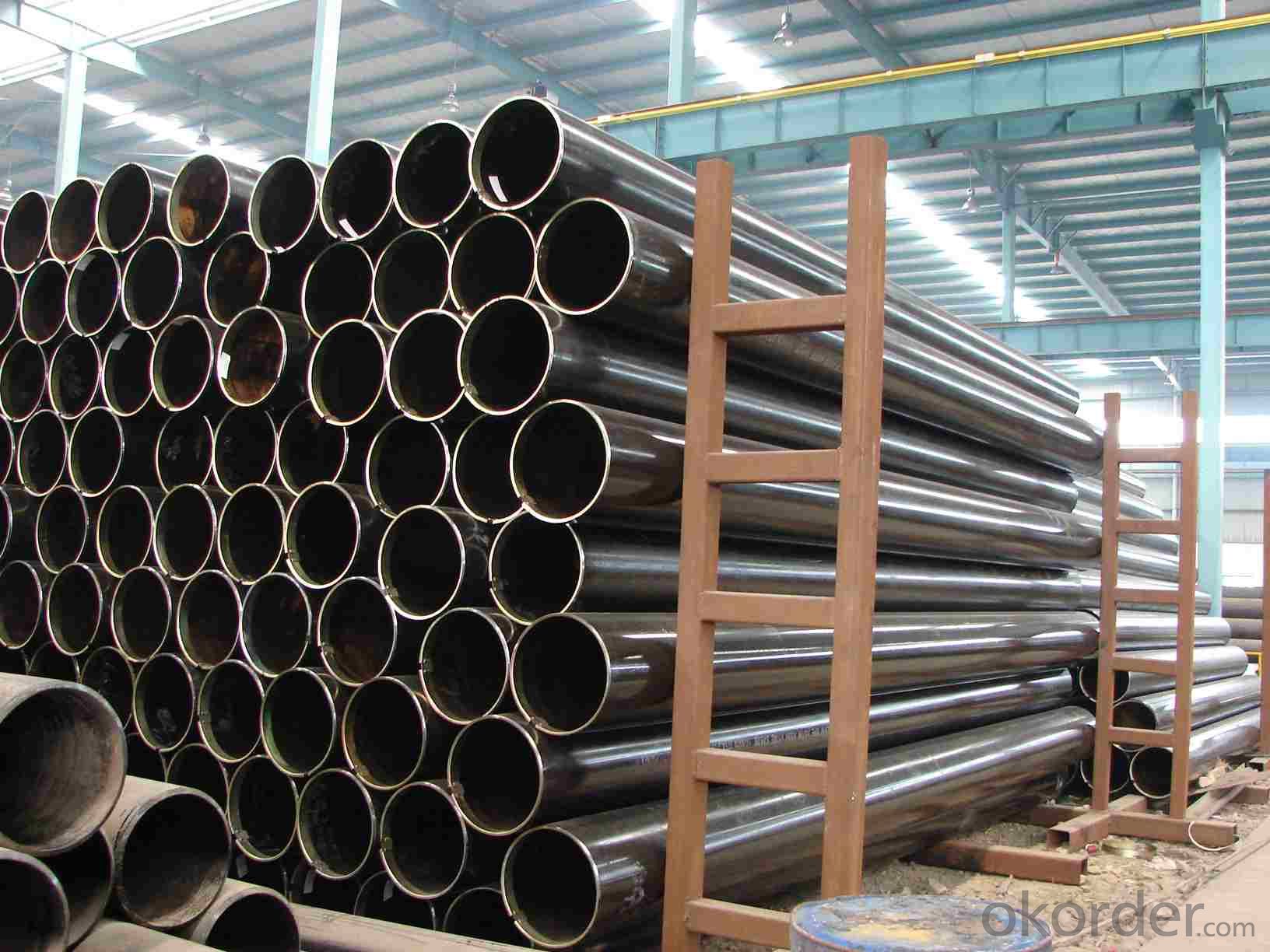
- Q: How do steel pipes perform in corrosive environments?
- Steel pipes perform well in corrosive environments due to their inherent resistance to corrosion. Steel is a durable and strong material that can withstand exposure to various corrosive elements such as moisture, chemicals, and saltwater. Additionally, steel pipes can be further protected through coatings or linings to enhance their resistance to corrosion, making them a reliable choice for applications in corrosive environments.
- Q: How are steel pipes used in water treatment plants?
- Steel pipes are commonly used in water treatment plants to transport and distribute water throughout the facility. They are used for various purposes, such as conveying raw water from the source to the treatment plant, distributing treated water to different areas, and carrying wastewater to the appropriate treatment processes. The durability and strength of steel pipes make them suitable for handling the high pressure and corrosive nature of water in these industrial settings.
- Q: How can two smooth steel pipes be joined? The size of the two pipe is different (except for welding)
- Rectangular fastener: used for the connection of two vertical intersecting steel tubes. It relies on the frictional force between the fastener and the steel tube to carry the load.Swivel fastener: used for connecting two steel tubes intersecting at any angle
- Q: How are steel pipes used in the construction of oil storage tanks?
- Steel pipes are commonly used in the construction of oil storage tanks for several purposes. Firstly, they are used to create the framework and structure of the tank, providing strength and durability to support the weight of the stored oil. Additionally, steel pipes are used for the internal and external piping systems of the tank, facilitating the transportation of oil to and from the tank. Finally, steel pipes are also employed for the ventilation and drainage systems of the tank, ensuring proper airflow and drainage to prevent any potential hazards or damage.
- Q: Are steel pipes resistant to impact?
- Yes, steel pipes are generally resistant to impact due to their high strength and durability.
- Q: How do you prevent corrosion in steel pipes?
- One effective way to prevent corrosion in steel pipes is by applying a protective coating, such as paint or epoxy, to the surface of the pipes. This barrier creates a physical barrier between the pipe and the surrounding environment, preventing moisture and corrosive agents from coming into direct contact with the steel. Additionally, regular inspection and maintenance of the pipes, including cleaning and repairing any damaged coating, can help identify and address potential issues before they lead to corrosion.
- Q: What are the different coatings applied to steel pipes?
- There are various coatings that can be applied to steel pipes to enhance their durability and protect them from corrosion. Some common coatings include fusion-bonded epoxy (FBE), which provides excellent corrosion resistance, and polyethylene (PE), which offers high impact strength. Other coatings include polyurethane (PU) and coal tar enamel, which provide additional protection against abrasion and chemical corrosion. Additionally, zinc coatings such as hot-dip galvanizing are used to prevent rust and extend the lifespan of steel pipes.
- Q: What are the different methods of pipe welding for steel pipes?
- There are several different methods of pipe welding for steel pipes, each with its own unique advantages and applications. Here are some of the most common methods: 1. Shielded Metal Arc Welding (SMAW): Also known as stick welding, SMAW is a manual welding process that uses a consumable electrode coated in flux. The electrode is melted to create the weld, and the flux creates a protective shield around the weld pool. SMAW is versatile and can be used in various positions, making it suitable for both field and workshop applications. 2. Gas Metal Arc Welding (GMAW): Commonly known as MIG (Metal Inert Gas) welding, GMAW uses a continuous wire electrode that is fed through a welding gun. The welding gun also supplies a shielding gas, such as argon or a mixture of argon and carbon dioxide, to protect the weld pool from atmospheric contamination. GMAW is known for its high welding speed and is often used in industrial applications. 3. Flux-Cored Arc Welding (FCAW): Similar to GMAW, FCAW uses a continuous wire electrode, but the wire is filled with flux instead of relying on an external shielding gas. The flux in the wire produces a protective shield around the weld pool, eliminating the need for a separate gas supply. FCAW is commonly used in outdoor and windy conditions as it provides better protection against atmospheric contamination. 4. Gas Tungsten Arc Welding (GTAW): Also known as TIG (Tungsten Inert Gas) welding, GTAW uses a non-consumable tungsten electrode to create the weld. The weld pool is protected by a shielding gas, typically argon, which is supplied separately. GTAW produces high-quality welds with excellent control, making it suitable for critical applications where precision is crucial. 5. Submerged Arc Welding (SAW): SAW is an automated welding process that uses a continuously fed wire electrode and a granular flux that is poured over the weld joint. The arc is submerged beneath the flux, providing excellent protection against contamination. SAW is commonly used in heavy fabrication and pipeline industries due to its high deposition rates and deep penetration capabilities. These are just a few of the different methods of pipe welding for steel pipes. The choice of method depends on factors such as the application, material thickness, desired weld quality, and available equipment. It is important to select the appropriate welding method to ensure strong, durable, and reliable welds in steel pipe applications.
- Q: How are steel pipes used in the construction of underground utilities?
- Steel pipes are commonly used in the construction of underground utilities due to their durability and strength. They are used to transport various substances such as water, gas, and sewage underground, ensuring efficient and reliable distribution. Steel pipes are resistant to corrosion and can withstand high pressure, making them ideal for underground applications where they need to withstand the weight of the soil and other environmental factors. Additionally, steel pipes are easy to install and maintain, making them a cost-effective choice for underground utility construction projects.
- Q: How do you calculate the pipe flow velocity for steel pipes?
- To determine the velocity of flow in steel pipes, two equations can be utilized: Manning's formula or the Darcy-Weisbach equation. 1. Manning's formula, commonly applied to open channel flow but also suitable for partially filled pipes, calculates velocity based on the pipe's hydraulic radius, slope, and Manning's roughness coefficient. The formula is as follows: Velocity (V) = (1.486/n) * (R^2/3) * (S^1/2) In this formula: - V represents the velocity - n denotes the Manning's roughness coefficient (obtainable from reference tables) - R signifies the hydraulic radius (cross-sectional area divided by wetted perimeter) - S indicates the slope of the energy grade line 2. The Darcy-Weisbach equation, widely used for pipe flow calculations, derives velocity from the pipe's diameter, roughness coefficient, and head loss due to friction. The equation is as follows: Velocity (V) = (2 * g * hL)^0.5 In this equation: - V represents the velocity - g stands for the acceleration due to gravity (approximately 9.81 m/s^2) - hL refers to the head loss caused by friction, which can be calculated using the Darcy-Weisbach equation: hL = (f * L * V^2) / (2 * g * D) In this equation: - f denotes the Darcy friction factor (dependent on the Reynolds number and pipe roughness) - L represents the length of the pipe - D indicates the diameter of the pipe Both formulas necessitate input parameters such as pipe dimensions, roughness coefficients, and slope. These parameters can be obtained from engineering references or pipe manufacturer specifications. It is essential to note that these formulas provide approximate values and may require iterations or adjustments for precise outcomes.
Send your message to us
Steel Pipe -- Welding Steel Tube ERW Factory
- Loading Port:
- Tianjin
- Payment Terms:
- TT OR LC
- Min Order Qty:
- 30 m.t.
- Supply Capability:
- 8000 m.t./month
OKorder Service Pledge
OKorder Financial Service
Similar products
Hot products
Hot Searches
Related keywords
